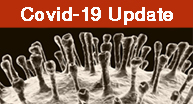Google search volume predicts the emergence of COVID-19 outbreaks
Google Trends and COVID-19 outbreak
Keywords:
coronavirus; coronavirus disease 2019; COVID-19; epidemiology; infodemiology; Google TrendsAbstract
Background and aim: Digital epidemiology is increasingly used for supporting traditional epidemiology. This study was hence aimed to explore whether the Google search volume may have been useful to predict the trajectory of coronavirus disease 2019 (COVID-19) outbreak in Italy. Materials and Methods: We accessed Google Trends for collecting data on weekly Google searches for the keywords “tosse” (i.e., cough), “febbre” (i.e., fever) and “dispnea” (dyspnea) in Italy, between February and May 2020. The number of new weekly cases of COVID-19 in Italy was also obtained from the website of the National Institute of Health. Results: The peaks of Google searches for the three terms predicted by 3 weeks that of newly diagnosed COVID-19 cases. The peaks of weekly Google searches for “febbre” (fever), “tosse”( cough) and “dispnea” (dyspnea) were 1.7-, 2.2- and 7.7-fold higher compared to the week before the diagnosis of the first national case. No significant correlation was found between the number of newly diagnosed COVID-19 cases and Google search volumes of “tosse” (cough) and “febbre” (fever), whilst “dyspnea” (dyspnea) was significantly correlated (r= 0.50; p=0.034). The correlation between newly diagnosed COVID-19 cases and “tosse” (cough; r=0.65; p=0.008) or “febbre” (fever; 0.69; p=0.004) become statistically significant with a 3-week delay. All symptoms were also significantly inter-correlated. Conclusions; Continuously monitoring the volume of Google searches and mapping their origin can be a potentially valuable instrument to help predicting and identifying local recrudescence of COVID-19.
References
Cucinotta D, Vanelli M. WHO Declares COVID-19 a Pandemic. Acta Biomed 2020;91:157-160.
Franchini AF, Auxilia F, Galimberti PM, Piga MA, Castaldi S, Porro A. COVID 19 and Spanish flu pandemics: All it changes, nothing changes. Acta Biomed 2020;91:245-250.
Signorelli C, Fara GM. COVID-19: Hygiene and Public Health to the front. Acta Biomed 2020;91:7-8.
Nicola M, Alsafi Z, Sohrabi C, et al. The socio-economic implications of the coronavirus pandemic (COVID-19): A review. Int J Surg 2020;78:185-193.
Lippi G, Henry BM, Bovo C, Sanchis-Gomar F. Health risks and potential remedies during prolonged lockdowns for coronavirus disease 2019 (COVID-19). Diagnosis (Berl) 2020;7:85-90.
Mattiuzzi C, Lippi G. Which lessons shall we learn from the 2019 novel coronavirus outbreak? Ann Transl Med 2020;8:48.
Lippi G, Sanchis-Gomar F, Henry BM. Coronavirus disease 2019 (COVID-19): the portrait of a perfect storm. Ann Transl Med 2020;8:497.
Lippi G, Mattiuzzi C, Cervellin G. Is Digital Epidemiology the Future of Clinical Epidemiology? J Epidemiol Glob Health 2019;9:146.
Cervellin G, Comelli I, Lippi G. Is Google Trends a reliable tool for digital epidemiology? Insights from different clinical settings. J Epidemiol Glob Health 2017;7:185-189.
Argenziano MG, Bruce SL, Slater CL, et al. Characterization and clinical course of 1000 patients with coronavirus disease 2019 in New York: retrospective case series. BMJ 2020;369:m1996.
Yuan X, Xu J, Hussain S, Wang H, Gao N, Zhang L. Trends and prediction in daily incidence and deaths of COVID-19 in the United States: a search-interest based model. Explor Res Hypothesis Med 2020;5:1-6.
Panuganti BA, Jafari A, MacDonald B, DeConde AS. Predicting COVID-19 Incidence Using Anosmia and Other COVID-19 Symptomatology: Preliminary Analysis Using Google and Twitter. Otolaryngol Head Neck Surg. 2020 Jun 2:194599820932128. doi: 10.1177/0194599820932128. Epub ahead of print.
Ciaffi J, Meliconi R, Landini MP, Ursini F. Google trends and COVID-19 in Italy: could we brace for impact? Intern Emerg Med. 2020 May 25:1–5. doi: 10.1007/s11739-020-02371-7..
Higgins TS, Wu AW, Sharma D, Illing EA, Rubel K, Ting JY; Snot Force Alliance. Correlations of Online Search Engine Trends With Coronavirus Disease (COVID-19) Incidence: Infodemiology Study. JMIR Public Health Surveill 2020;6:e19702.
Wise J. Covid-19: Risk of second wave is very real, say researchers. BMJ 2020;369:m2294.

Downloads
Published
Issue
Section
License
This is an Open Access article distributed under the terms of the Creative Commons Attribution License (https://creativecommons.org/licenses/by-nc/4.0) which permits unrestricted use, distribution, and reproduction in any medium, provided the original work is properly cited.
Transfer of Copyright and Permission to Reproduce Parts of Published Papers.
Authors retain the copyright for their published work. No formal permission will be required to reproduce parts (tables or illustrations) of published papers, provided the source is quoted appropriately and reproduction has no commercial intent. Reproductions with commercial intent will require written permission and payment of royalties.






